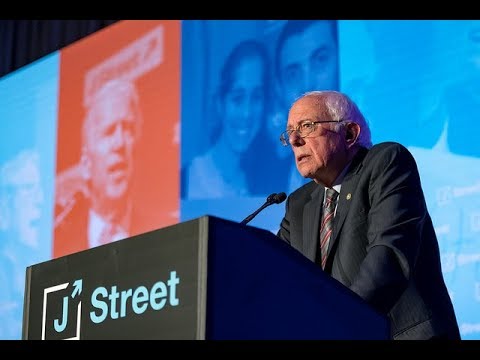J Street has announced that Democratic presidential candidates Sen. Bernie Sanders (I-Vt.), Sen. Amy Klobuchar (D-Minn.), former U.S. Housing and Urban Development Secretary Julian Castro, Sen. Michael Bennet (D-Colo.) and Mayor of South Bend, Ind. Pete Buttigieg are scheduled to attend its annual conference in Washington, D.C., later this month.
The 2020 candidates will sit with the hosts of the weekly podcast “Pod Save the World,” former White House National Security Council spokesperson Tommy Vietor and former U.S. Deputy National Security Advisor for Strategic Communications Ben Rhodes to “discuss the future of the U.S.-Israel relationship, their visions for resolving the Israeli-Palestinian conflict, their plans to combat the growing threat of white supremacy and more,” according to an email from J Street ahead of the conference, which will take place from Oct. 26-29.
JNS has reached out to the candidates for comment about their participation in the conference.
Aside from Bennet, the aforementioned candidates have said, if elected, that they would re-enter the United States in the 2015 Iran nuclear deal, which J Street supports and that U.S. President Donald Trump withdrew from in May 2018, reimposing sanctions lifted under it along with enacting new financial penalties against the regime.
Additionally, Buttigieg has spoken out against Trump recognizing earlier this year Israel’s sovereignty over the Golan Heights, telling JNS in August it was “an intervention in Israeli domestic politics.”
U.S. Senate Minority Leader Chuck Schumer (D-N.Y.), Speaker of the House Nancy Pelosi (D-Calif.), Sen. Chris Van Hollen (D-Md.) and Rep. Pramila Jayapal (D-Wash.) also plan to be there.
Schumer and Pelosi are frequent speakers at the annual policy conference of the American Israel Public Affairs Committee (AIPAC). Klobuchar spoke at the AIPAC conference in 2018. Sanders, who skipped the AIPAC event in 2016 while unsuccessfully running for the Democratic presidential nomination, addressed the J Street conference in 2018.
Jayapal was one of 17 representatives to vote against a July resolution in the U.S. House of Representatives condemning the anti-Israel BDS movement, while Sanders and Van Hollen were two of 23 senators in February to vote against the Strengthening America’s Security in the Middle East Act, which, if enacted, would impose new sanctions on Syria, boost security cooperation with Israel and Jordan, and allow state and local governments the right to punish state or local contractors from engaging in boycotting Israel.
‘A dangerous phenomenon that exploits Israeli democracy’
The J Street conference also features speakers from anti-Israel organizations including IfNotNow, the New Israel Fund, and the Palestine Liberation Organization (PLO) national and central councils.
Additionally, Jewish Democratic Council of America executive director Halie Soifer, IfNotNow founder Emily Meyer and Bashar Azzeh, a member of the PLO Central Council, are listed as speakers.
IfNotNow has been accused of anti-Semitism and anti-Zionism. According to its mission, the organization seeks to “end American Jewish support for the occupation,” which advocates say is “is a system of violence and separation by which Israel denies Palestinians freedom and dignity by depriving them of civil, political and economic rights.”
The group has been approaching Democratic presidential candidates as representatives of the Jewish community and asking them about ending the so-called “occupation” of the West Bank.
The term “occupation” initially applied to Palestinian areas the Israelis oversaw after gaining land (eastern Jerusalem, the West Bank, the Gaza Strip, the Golan Heights and much of the Sinai) in the 1967 Six-Day War—land the Arabs refused to negotiate as part of the Khartoum Conference in 1968, signified by “Three No’s” in reference to Israel: no peace, no recognition, no negotiations.
Ever since then, the word has been used by anti-Israel groups in the attempt to delegitimize Israel. Yet as with most terminology used in the Israeli-Palestinian conflict, no clear definition exists, even after the Palestinian Authority has overseen Arab-majority sections (known as Area A under the Oslo Accords) of the West Bank since 1994 and Hamas has run Gaza since 2007 (taking it away from the P.A. after Israelis withdrew in 2005). Egypt negotiated with Israel to get the Sinai back in 1982 as part of direct negotiations with Israel.
Still, some consider all of Israel to be “occupied” territory.
“We understand the Occupation as the military rule over Palestinians in the West Bank, East Jerusalem and Gaza,” IfNotNow spokesperson Yonah Lieberman previously told JNS. “We also know that the discrimination and displacement inside Israel’s 1948 borders are connected to its rule in those Occupied Territories. This system of violence deprives all Palestinians of civil, political and economic rights.”
“Obviously, IfNotNow is not part of the mainstream of the Democratic Party,” former National Jewish Democratic Council head Aaron Keyak previously told JNS. “In fact, I think if you posed the question to them, they’d agree and they certainly don’t try to hide it. In IfNotNow’s organizational principles they clearly refuse to take a stance against BDS or in support of the two-state solution.”
The New Israel Fund is the largest financier of Israel’s left-wing civil society and funds highly controversial NGOs, including Breaking the Silence, B’Tselem and Adalah. Some NGOs funded by NIF and foreign governments are even eligible for Israeli National Service positions.
Im Tirtzu CEO Matan Peleg has said that “leading members of the New Israel Fund, for example, clearly stated that the NIF and its organizations represent the opposition in Israel; the same foreign opposition that is working to topple the elected government and change its policy. This is a dangerous phenomenon that exploits Israeli democracy in order to harm it and needs to be stopped immediately.”
Finally, the PLO is known to be behind violence against Israelis, including during the Second Intifada from 2000 to 2005, despite recognizing in 1993 Israel’s right to exist.
The PLO mission in Washington, D.C., was shuttered in October 2018.


























